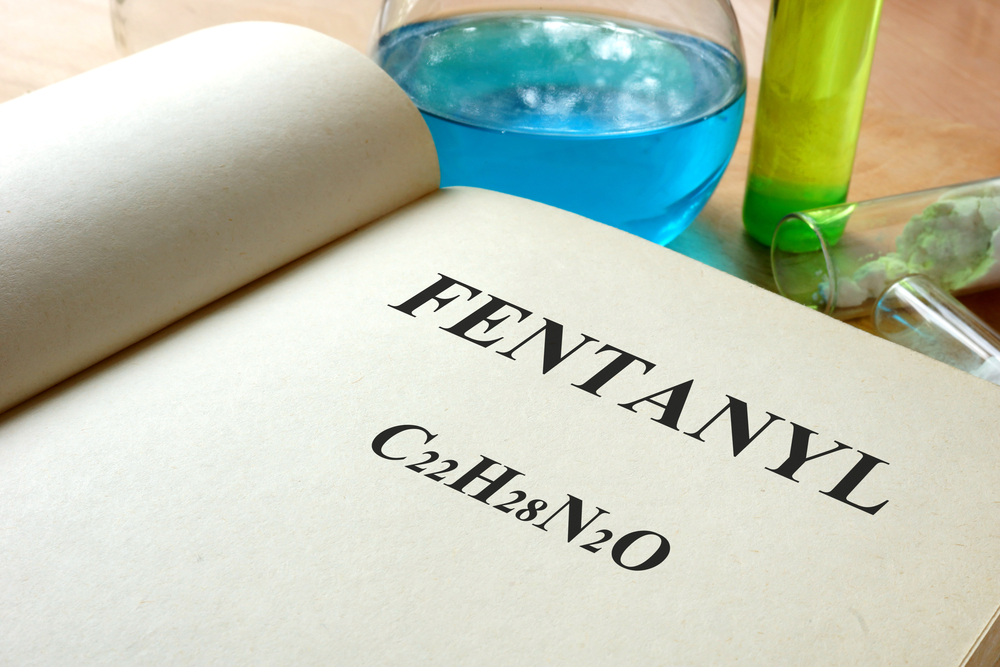What is Fentanyl?
Fentanyl is an extremely potent synthetic opioid, it is up to 100 times more potent than Morphine. Opioids are a class of drug derived from Opium plants, however, Fentanyl is made in a lab. Fentanyl is prescribed to treat severe pain, usually after surgery or pain associated with cancer, or chronic pain that has not responded to other opioids. Fentanyl is highly addictive, even in the smallest doses, and it accounts for nearly half of all opioid overdose deaths. Other names for Fentanyl include Duragesic, Actiq, and Sublimaze. Fentanyl comes in a variety of forms including, nasal or oral sprays, tablets, lozenges, injections, and patches.

Fentanyl Effects
Similar to other drugs in the opioids class, Fentanyl works by binding to the opioid receptors in the brain, causing a euphoric effect. Other effects include:
- Drowsiness
- Difficulty breathing
- Feeling extreme happiness
- Nausea or vomiting
- Difficulty breathing
- Sedation
- Constipation
- Confusion
- Loss of consciousness
- Constricted pupils
Signs of Fentanyl Abuse and Addiction
Fentanyl Abuse and Addiction have reached epidemic levels in the United States, with over 91,000 people dying from overdoses in 2020. Due to the potency of the medication, abuse can quickly lead to addiction. Knowing the signs of abuse can truly help save a life. Signs of Fentanyl abuse or addiction include:
- Consuming more opioids than previously needed to achieve the same effect, or developing a tolerance
- Craving Fentanyl
- Loss of interests
- Inability to maintain stable employment or attend to responsibilities
- Continued use despite it negatively impacting your life
- Putting yourself in unsafe situations, such as driving while under the influence
- Spending a lot of time recovering from Fentanyl use, but continuing to use it
- Mood swings
- Experiencing withdrawal symptoms when not taking it
Fentanyl Withdrawal Symptoms
As with any opioid use, tolerance to the drug causes people to take more of it than previously needed to achieve the same effect. When tolerance develops and then it is not taken for a period of time, withdrawal symptoms can occur. Withdrawing from Fentanyl can cause:
- Intense cravings
- Nausea or vomiting
- Inability to sleep
- Bone or muscle pain
- Full body chills and goosebumps
- Involuntary leg movements
Long Term Effects of Fentanyl Abuse
Arguably the most dangerous long term effect of Fentanyl abuse is overdose, which can be fatal if not treated promptly. Signs of a Fentanyl overdose include shallow breathing, thin/thready pulse, bluish tint around mouth and fingers, pinpoint pupils, loss of consciousness, or choking sounds. If you suspect someone has overdosed, call 911, start CPR, administer Narcan if possible, and stay with them until help arrives. Opioid overdoses are reversible, can be easily treated with Narcan, and you cannot face criminal charges for being with someone who has overdosed so you should never leave someone unattended if you suspect they’ve overdosed.
Other long term effects include:
- Chronic constipation which can lead to bowel obstruction
- Heart failure or heart attack
- Trouble breathing when sleeping
- Weakened immune system
- Reproductive or hormonal issues in both men and women
- Increased anxiety, depression, or worsening of mental health conditions
Fentanyl Addiction Treatment
Fentanyl addiction treatment is often a multistep process. Prior to beginning treatment, medical detox is usually advised due to the potential complications that can occur from withdrawing from opioids. Withdrawal symptoms can range from mild to severe and are usually quite painful and unpleasant. Detoxing in a medical facility allows you to be monitored by nurses and doctors who can administer medications, fluids, or other interventions to keep you safe and comfortable while the drug leaves the body.
After detox, an inpatient drug treatment program usually follows. In an inpatient program, you will have a comprehensive, personalized treatment plan that is unique to your life situation and your treatment goals. Addiction Treatments in Los Angeles, includes a variety of therapies, group therapies, and 12 step programs to assist you in working through past trauma and learn healthy alternatives to coping with stress. Medications can also be utilized in addiction treatment to help decrease cravings for opioids and help the brain begin to return to normal functioning. Alternative trauma treatments such as EMDR, TIR, and RRT. If an inpatient program does not fit into your life right now, there are several types of outpatient programs that can assist you in your journey to recovery. If you or a loved one would like more information about Fentanyl addiction treatment, the addiction specialists at Novo Detox are happy to answer your questions.




